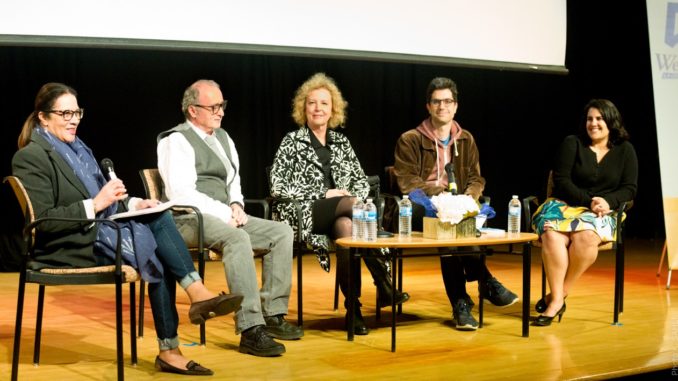
“There was one that got me – it was just so funny, and I thought, yes that seems perfect, and then I realized, after I re-tweeted it – a little too perfect. It was a joke, but it was fake news, and I’d been had.” When Melanie Mason of the Los Angeles Times told her tale of being taken in by a faux screen shot of what looked to be a New York Times article about then-Speaker of the House Paul Ryan, she was honest about feeing abashed. But her point – that even professionals with high standards can be fooled by reacting too quickly, and checking sources after the ‘send’ – was the evening’s echo.
The Fine Arts Theater on the West Los Angeles College Campus was crowded with curious students on Tuesday April 16, 2019. The Kids Scoop Media event from producer Michelle Mayans “Discerning Truth From Fiction; Finding Facts in Today’s Volatile News Climate” brought together some of the world’s most notable journalists to discuss fake news and social media, offering professional insights and clarity into a difficult reality.
The panel was moderated by NPR’s Karen Grigsby Bates, who spoke with Mason, The Sunday [London] Times‘ John Harlow, Le Monde’s Lauren Borredon and the panel’s only academic voice, Caryn Wiley-Rapoport of the Fielding Graduate Institute. With Harlow and Borredon offering the international perspective on ‘fake news’ it was clear that this was not just a national issue.
“The term ‘fake news’ was first used in the 1890’s” noted Harlow “so what we are dealing with here isn’t new, it’s just come back in a more virulent form.” He also offered that the term itself – fake news – is now against the law in the U.K. “Bit of a difficult situation for Murdoch,” referring to the infamous media mogul whose ‘lowest common denominator’ style in tabloids and newspapers has led to worldwide downgrade of journalistic standards.
When asked if politics in France was suffering because of ‘fake news’ Borredon gave a yes and no answer; the most recent presidential election had been ‘hacked’ by Russian social media influencers, but seemed to be stopped by the French law that puts a moratorium on political advertising and discussion 48 hours before the vote. “They [the Russians] thought they had timed it for maximum effect, but the French opted not to listen.” He also agreed – in agreement with Mason – that the speed of people’s reactions seemed to defeat critical thinking. “People put up [social media] nonsense about what teachers are doing, and then parents pull their kids out of school in a panic. The propaganda is just designed to disrupt society.”
The standard practice of presenting both sides of a story, even when one is patently untrue, reflected on climate change and the anti-vaxx movement. Mason had good news on that front. “We had a stylebook change at the LA Times, specifically to move the standard on climate change. We do not have to present a ‘balanced’ point of view when the balance is unscientific. Facts need to be refuted by facts, not opinions. ” Harlow added “When 99 out of 100 scientists agree, why go hunting for the one that going to say otherwise?”
Wiley-Rapoport gave some solace for the future. “The pendulum will always swing back, so the extremes that we are dealing with now are not permanent.” She also confessed to being hacked on Facebook by a ‘personality test’ that was posted by the now-disgrace Cambridge Analytica. “It was just a bit of fun, you know, wanting to confirm that yes, I have the kind of personality I already know I have, but of course, they got info on all my Facebook friends, and we know how they used that data.”
While being savvy on social media isn’t always second nature, it’s clearly the habit to cultivate.
In response to a question from the audience about practicing responsible journalism, several panelists gave the same answer; listen carefully, don’t judge, and keep it factual. Bates even offered that it was good practice to “get into the scene before you need to be there, do some background research on the ground; just walking around, sitting in a coffee shop, get a feel for the places that people really inhabit. Then when you talk with them, you are not someone who just dropped by to ask questions. People are all too used to be exploited. Practice your craft in a way that lets them feel their stories matter, that they are being heard.”
Judith Martin-Straw
Pictured above, left to right – Karen Grigsby Bates, John Harlow, Karyn Wiley-Rapoport, Lauren Borredon and Melanie Mason.
Photo Credit – Karim Sahli


Be the first to comment